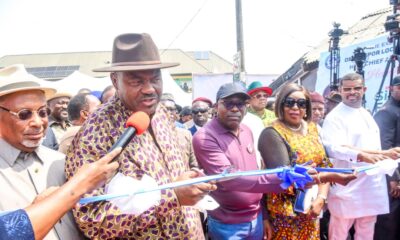Health
Transformation Agenda: FG Surpasses Targets In 8 Sectors
The Federal Government
said yesterday that it had surpassed its growth targets in eight out of the 14 broad sectors of the Nigerian economy under the Transformation Agenda.
The Minister of Information, Mr Labaran Maku, stated this in Abuja at the monthly news conference on the performance of the economy and the power sector.
Maku listed the sectors as solid minerals, financial institution and insurance, building and construction, transport, education, road and estate, public administration and agriculture.
According to him, the feat achieved is an indication that the Transformation Agenda is on course and that the economy is growing in the right direction.
He said that claims by some analysts that the nation had gone bankrupt and that the economy was performing poorly was deceptive.
The minister said that apart from the unprecedented growth recorded in some sectors, other micro and macro-economic indices sanctioned by reputable global organisations had indicated growth in the economy.
Maku said that the most interesting thing about Nigeria’s economic growth pattern was that the GDP growth was largely driven by the non-oil sector.
“There is something that Nigerians need to know about this economy that has been run down by some pessimists, and that is the growth, which is driven largely by the non-oil sector of the economy.
“Agriculture has recorded 27.64 per cent, wholesale and retail trade has 28.4 per cent, telecommunications – 24.38 per cent.
“Foreign Direct Investments averaged 7.97 billion dollars in 2011 and 2012 from 6.10 billion dollars in 2010 and is still the highest in Africa.
“Home remittances increased from 19.20 billion dollars in 2009 to 20.61 billion dollars in 2011 and 21.89 billion dollars in 2012, Gross External reserves improved from 32.34 billion dollars in 2010, to 48.8 billion dollars as of April 26, 2013.”
On the administration’s anti-corruption campaign, Maku said the administration had adopted electronic means to block leakages in the system and minimise waste.
According to the minister, N118.9 billion has been saved from 215 Ministries, Departments and Agencies (MDAs) under the electronic payroll system.
He reiterated government’s resolve to block avenues for corruption in public service, hence the resolve to adopt automated means of resource management.
“What we are doing is to tackle problems from the root and a lot of leakages are being blocked and by the time we finish what we are doing, there will be sanity in the system.
Health
‘How Micro RNA Research Won Nobel Prize’
Two United States scientists who unraveled the human micro RNA have won the Nobel Prize in Physiology or Medicine 2024.
Victor Ambros and Gary Ruvkun won the coveted prize for their work on microRNA as their discoveries help explain how complex life emerged on earth and how the human body is made up of a wide variety of different tissues.
MicroRNAs influence how genes – the instructions for life – are controlled inside organisms, including humans.
Every cell in the human body contains the same raw genetic information, locked in our DNA.
However, despite starting with the identical genetic information, the cells of the human body are wildly different in form and function.
The electrical impulses of nerve cells are distinct from the rhythmic beating of heart cells. The metabolic powerhouse that is a liver cell is distinct to a kidney cell, which filters urea out of the blood.
The light-sensing abilities of cells in the retina are different in skillset to white blood cells that produce antibodies to fight infection.
So much variety can arise from the same starting material because of gene expression.
The US scientists were the first to discover microRNAs and how they exerted control on how genes are expressed differently in different tissues.
The medicine and physiology prize winners are selected by the Nobel Assembly of Sweden’s Karolinska Institute.
They said: “Their groundbreaking discovery revealed a completely new principle of gene regulation that turned out to be essential for multicellular organisms, including humans.
“It is now known that the human genome codes for over 1,000 microRNAs.”
Health
WHO Begins Regulation On Antibiotic Waste
The World Health Organisation (WHO) has begun acting to curb effects of antibiotic pollution.
The new guidance on wastewater and solid waste management for antibiotic manufacturing sheds light on this important but neglected challenge ahead of the United Nations General Assembly (UNGA) High-Level Meeting on antimicrobial resistance (AMR) taking place on 26 September 2024.
The emergence and spread of AMR caused by antibiotic pollution could undermine the effectiveness of antibiotics globally, including the medicines produced at the manufacturing sites responsible for the pollution.
Despite high antibiotic pollution levels being widely documented, the issue is largely unregulated and quality assurance criteria typically do not address environmental emissions. In addition, once distributed, there is a lack of information provided to consumers on how to dispose of antibiotics when they are not used, for example, when they expire or when a course is finished but there is still antibiotic left over.
“Pharmaceutical waste from antibiotic manufacturing can facilitate the emergence of new drug-resistant bacteria, which can spread globally and threaten our health. Controlling pollution from antibiotic production contributes to keeping these life-saving medicines effective for everyone,” said Dr Yukiko Nakatani, WHO Assistant Director-General for AMR ad interim.
Globally, there is a lack of accessible information on the environmental damage caused by manufacturing of medicines.
“The guidance provides an independent and impartial scientific basis for regulators, procurers, inspectors, and industry themselves to include robust antibiotic pollution control in their standards,” said Dr Maria Neira, Director, Department of Environment, Climate Change and Health, WHO. “Critically, the strong focus on transparency will equip buyers, investors and the general public to make decisions that account for manufacturers’ efforts to control antibiotic pollution.”
Health
Kebbi Harmonises Doctors’ Salaries To Curb Brain Drain
In a concerted effort to curb brain drain, the Kebbi State Government has harmonised medical doctors’ salaries to be at par with their colleagues in the federal government’s tertiary health facilities.
Kebbi State Commissioner for Health, Musa Inusa-Isma’il, disclosed this at the handing over of ambulances to the state-owned health facilities at the Ministry of Health in Birnin Kebbi yesterday.
Inusa Isma’il, according to a statement by Ahmed Idris, the Chief Press Secretary to the governor, said the essence of the harmonisation was to retain the existing medical doctors and attract more to the services of the state.
According to him, the doctors across the state had already started enjoying the new salaries from August 2024.
He said the release of the vehicles was in fulfilment of Governor Nasir Idris’ promise to uplift health care services in the state.
“His Excellency said I should inform you, the beneficiaries of this gesture, that the vehicle should be strictly used for the intended purpose. It should not be used for anything else.
“If there is no referral case, each of the vehicles must be parked at the hospital by 6 pm. The governor said you should warn your drivers against reckless driving as well as violating the instructions.
“We should also do everything possible to reciprocate the gesture by working according to the terms and conditions attached,” he advised.
The benefiting health facilities included Sir Yahaya Memorial Hospital, Birnin Kebbi; State Teaching Hospital, Kalgo; General Hospital, Argungu; General Hospital, Yauri; General Hospital, Zuru; and General Hospital, Bunza.
In his speech, the permanent secretary of the ministry, Dr Shehu Koko, recalled that the ambulances were handed over to the ministry last Friday by the governor for the onward handover to the benefiting hospitals.
He observed that the ambulances would go a long way in improving the referral system in the state, adding that delays in reaching the secondary and tertiary facilities would be eliminated.
The permanent secretary attributed the high rate of maternal mortality in the country to delays in getting to the health facilities for proper medical care.
“We believe with the provision of these ambulances, part of the gaps we have in our referral system will be addressed, whereby patients who require secondary healthcare could be easily transported to secondary and tertiary health centres, where they can get such help,” he said.
In a goodwill message, Commissioner for Information and Culture Alhaji Yakubu Ahmed expressed gratitude to the governor for the support he has given to the ministry to excel.
While advising the beneficiaries to use the vehicles judiciously, the commissioner advised that services and maintenance of the vehicles must be prompt to derive the maximum benefits from the vehicles.
The commissioner also highlighted some achievements recorded by the government in the last year, including beautification of the state capital, completion of a multimillion-naira ultramodern state secretariat, road construction, construction and renovation of classrooms and upgrading of some health facilities, among others.
-

 Business4 days ago
Business4 days agoNDLEA, NIMASA Strengthen Cooperation Against Drug Trafficking
-

 Featured4 days ago
Featured4 days agoTinubu calls for increased currency swap between China, Nigeria
-
News3 days ago
Work on Eleme Road delaying fuel distribution from PH Refinery – PETROAN
-
Rivers4 days ago
PH/Owerri Road Users Express Relief Over Killing Of Kidnap Kingpin
-

 Featured4 days ago
Featured4 days agoFG urges unified efforts against emerging COVID-19 threats
-

 Business4 days ago
Business4 days agoNigeria’ll Lead In Agricultural Export This Year – Tinubu
-

 News4 days ago
News4 days agoYou’ve Shown Courage In Defence Of Rivers, Fubara Tells Sen Mbata …As He Marks 65th Birthday
-
Rivers4 days ago
Commissioner Commends Gov Over Support For Ministry


